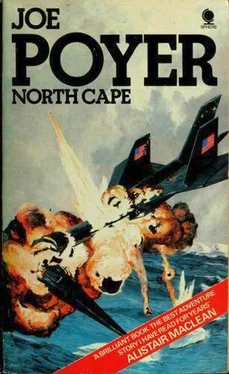The boat ran on, cutting around the final curve of the rock out-thrust, and cautiously Larkin edged even closer to the rock wall. The noise of the engine was faint, but he wondered if the soft whoosh of the steady wind would be enough to conceal it from the lookouts that would surely be stationed on the sub’s bridge. Before they cleared the final jut of rock, Larkin idled the engine down and let the boat drift, slipping the gears into reverse but keeping the clutch depressed. The whaleboat continued under its own momentum, and there against the far shore was the sail of the submarine. The bows were pointing in toward the eastern side and she seemed to be anchored in the middle of the fjord, although Larkin knew that no skipper in his right mind would anchor under these conditions. Then he heard the muffled chugging of engines. She was using her engines to keep station. Larkin was flabbergasted. She was not nuclear powered. Those were diesel engines.
What a lucky break, he thought If they cut directly across the fjord and approached from the stern the chances of being spotted by the lookouts, who would be watching the eastern cliffs, were remote. And he could make speed. The noise of the submarine’s own engines would cover the whaleboat’s.
“Watch them very carefully. We’re going in.”
Larkin shifted back into forward and let the clutch out in one smooth motion. He pulled the throttle out and felt the reassuring feel of the boat as it leaped ahead. Five minutes. That’s all he needed. Five minutes.
He almost got it. They were fifty feet from the submarine’s stern when they were spotted. Larkin kept the throttle out until the last moment, as two sailors from the lookout stations came running aft to see who they were. One called out something questioning in Russian that sounded like Norski.
“Norski,” he shouted back, promptly exhausting his Norwegian vocabulary. He cut the engine and called softly to his men, — “When I yell go… do so. But no shooting unless you have to.”
As they pulled up to the stern a figure appeared on the bridge, took one look, and ducked back out of sight. Larkin could almost hear him frantically calling the bridge. A line was thrown to the two Russian sailors, who caught it and pulled in. While they were occupied with the rope, Larkin bellowed, “Go.” His own men poured out of the whaleboat and onto the sloping stern to the surprise of the two Russians, who dropped the rope and reached for their slung rifles. They never had a chance. It seemed that half a dozen carbine butts hit all at once. They dropped without a sound.
Larkin leaped onto the stern and immediately felt a vibration run through the ship as the beat of the engines deepened at the same time.
“Get those charges set!” From forward and the bridge simultaneously came the sound of hatches slamming shut.
“Peterson, you and Johnson take the aft hatch. Orlowski and Brone get a charge against that ballast tank, where it joins the hull five feet toward the hatch. Move!” As the men jumped onto the decking with the demolition charges, Larkin could feel the submarine begin to move. He knew that it would take less than thirty seconds to get up enough weigh and ballast to get the decks under water.
He yelled at the remaining four men and ran for the sail and bolted up the ladder. The bridge was clear, all hatches battened down.
“Two of you up on the lookout. The rest, get around the sides, out of sight.” Larkin backed away rapidly. He knew that when the charges went off somebody was going to come out of that hatch, and they would probably come out shooting. He waved the two men now on the catwalk to watch the forward hatch.
“Anybody comes out, open up.”
He glanced around quickly and swung back down over the side to see how the demolition parties were coming. Both were running for the bridge, the ignition wires trailing out behind them to the charges taped against the hatch and ballast tank. Larkin hopped back onto the bridge and shouted-down to fire the charges. Already the after portion of the deck was under water and forward, waves were curling up around the forepeak.
The explosives went off with a resounding clang. The submarine shuddered along its length and the engines changed beat as he heard the high-pitched whoosh of compressed air blowing ballast from the tanks.
Larkin yanked the VERY pistol from his belt and fired the flare straight up into the rapidly darkening sky. The flare arced up to three hundred feet and burst with a beautiful display of red flame. In less than two minutes the RFK should burst around the headland. He broke open the pistol, ejected the second flare, and rammed a new one home. Larkin had estimated that it would take the RFK six minutes or so to reach the submarine. He had managed to stop the submarine; now could he capture it before the RFK smashed it to the bottom under her forefoot?
He leaned over the coaming once more and shouted down. “Peterson, you and Johnson get back to the boat and be ready to take us off. Orlowski, you and Brone cover that aft hatch, just in case.”
He swung around in time to hear the squeal of the hatch being opened, and drew his pistol with his right hand. He waved the others back around the curve of the bridge. The hatch cracked open, held a moment, then pushed farther up. Larkin knelt down, almost in back of the hatch, and waited. From where he knelt, he was out of sight. A head appeared, looked around, and, seeing no one, pushed the hatch back until the lift engaged and it clicked back. Larkin leaned forward and pressed the pistol muzzle into the temple of the emerging sailor.
Larkin had never seen anyone turn white so fast, and in spite of the tension he grinned.
“ Strasvechi, tovarish — Americanski. ” Then in English, “Do you speak English?” Very carefully the head wobbled back and forth in what Larkin took for a negative answer. The sailor, with the .445 Navy Colt pressed against his temple, looked ready to faint.
“ Nyet ,” he managed to force out.
Above his head, Larkin heard two carbines firing.
“What’s going on?” he demanded sharply.
“Trying to get out the forward hatch, sir. We fired a couple of bursts across the deck and they changed their minds.” “Good, keep ’em scared.” Larkin risked a quick look at his watch. Pour minutes to go. “Any sign of the ship?” he yelled.
“No, sir… wait, aye, sir, just rounding the headland now.” “Anybody down there speak English?” Larkin called through the hatch.
After a moment, a voice answered, “Yes.”
Larkin tapped the sailor on the head with the pistol butt “Down, buddy…. All right, get up here fast.”
A minor commotion was created in the narrow hatchway as the reprieved sailor scrambled down past the other climbing up. Another minute was wasted while he did so. Larkin waved his pistol and an officer climbed out to stare around in shock. The Russian was dressed only in shipboard uniform and gasped as he felt the cold. He immediately huddled against the canvas windbreak that had been rigged on the bridge.
“My name is Larkin, commanding officer of the battle cruiser Robert F. Kennedy, United States Navy. You are now a prisoner of war and your ship a prize of war.” Larkin knew that this was not true since no state of war had been declared, but he was depending on the shock value of the statement to unbalance the Russian even more. The Russian glanced around and saw the others with leveled carbines, gulped once, and swung back to stare at Larkin, who was casually slinging his carbine over his shoulder.
“I… I… I am Ptior Shafesky Rasnikov, Lieutenant Commander…” He broke down and finished up lamely, “Executive Officer… what are you—”
“Cut it,” Larkin grated harshly. “You have just two minutes left to surrender this ship. Look out there.”
Читать дальше












